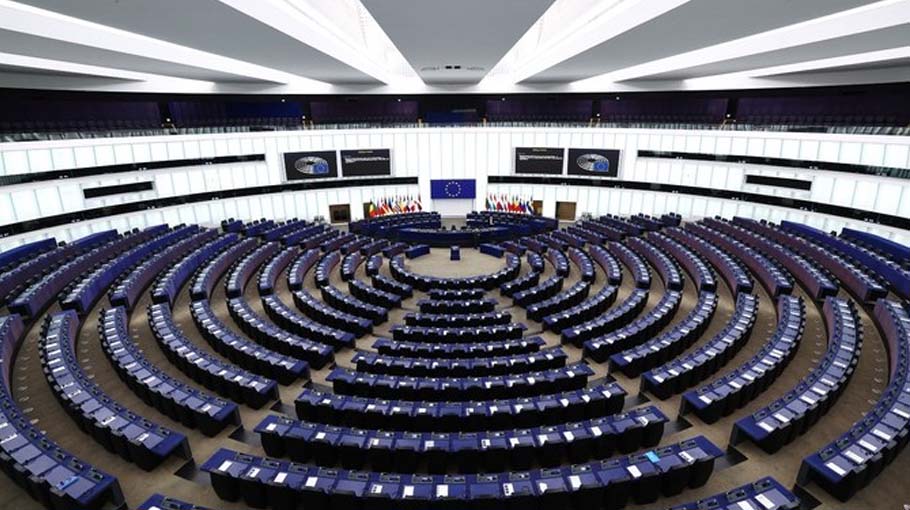Foreign policy challenges loom large over EU summit

As the clock ticks toward June’s big European Parliament elections across the EU’s 27 member states, politics in Brussels is becoming increasing domestic-focused. However, there has rarely been a time in recent years when so many red lights are flashing outside of the bloc, in what has been called an “arc of instability.”
That term was first used in the 1990s, especially by Australians, to describe a chain of politically unstable nation states in the Asia-Pacific region. However, more recently, it has been utilized by some US policymakers to highlight instability in a different, broader geography. That is a spectrum of states from sub-Saharan Africa through North Africa, into the Middle East, Eastern Europe and the Caucasus, plus South and Central Asia and possibly parts of Southeast Asia too.
Some of this vast geography will be among the key topics of discussion at the ongoing summit of the EU’s 27 presidents and prime ministers. One example is the growing tensions in the Middle East, with the EU’s chief diplomat Josep Borrell this week condemning Israel for creating what he said was a “manmade” famine in Gaza.
Borrell added: “Before the war, Gaza was the greatest open-air prison. Today, it is the greatest open-air graveyard.” Moreover, he said European leaders have told Israeli Prime Minister Benjamin Netanyahu they cannot stand by and watch Palestinians starve to death.
There is growing concern in Europe about the possibility of a new migration crisis if conflicts spill over
In North Africa, meanwhile, Sudan could face a catastrophic famine within weeks, aid workers have warned, amid security restrictions and armed violence as the war between the Sudanese Armed Forces and its former security partners the Rapid Support Forces continues. The UN’s World Food Programme says this threatens to trigger “the world’s largest hunger crisis,” with more than 25 million people scattered across Sudan, South Sudan and Chad “trapped in a spiral” of food insecurity. The conflict has also uprooted more than 8 million people. With 2 million forced from their homes before the fighting broke out, Sudan already hosts the world’s largest displacement crisis.
There is growing concern in Europe about the possibility of a new migration crisis if the numerous conflicts in the Middle East and Africa spill over into neighboring countries. This is in a context where multiple European governments are still dealing with the impact of the 2015 migration crisis, which saw about 1 million Syrian refugees cross from Turkiye into Greece alone, according to UN estimates.
One of the other big concerns for European leaders is that the growing proliferation of foreign challenges will distract or undermine the political focus of the West from what many see as the overwhelming international priority: Ukraine. In recent weeks, there have been growing Russian advances on the battlefield and NATO Secretary-General Jens Stoltenberg said last week that Kyiv is running out of ammunition and that its allies are not doing enough to help. This comes as a bill in the US Congress to send further aid to Ukraine continues to stall amid deep partisan divisions ahead of elections there in November.
In this context, there is a huge body of work for the EU still to undertake to become a more fit-for-purpose, progressive force in the world today. In the 1990s, then-Belgian Foreign Minister Mark Eyskens said that the bloc is “an economic giant, a political dwarf and a military worm.” Therefore, it is no coincidence that EU leaders will this week discuss security and defense as a pressing priority. There is unanimity within the bloc that Europe needs to increase its defense readiness, so there will be talks on exactly how to build the EU’s strength, resilience and competitiveness.
There is a huge body of work for the EU still to undertake to become a more fit-for-purpose, progressive force
European Commission President Charles Michel said this week that, if Europe wants to exist in peace, it must shift to a “war economy” mode. He said that this requires significantly bolstering defense capabilities in the face of the threat posed by Russia.
Michel added that US support can no longer be taken for granted and that EU countries need to take much more responsibility for their own security as they grapple with the biggest security challenge since 1945. He also condemned a decades-long lack of funding and investment in European militaries and, despite military manufacturing capacity increasing by 50 percent since the start of Russia’s full-scale invasion, much more needs to be done.
Beyond these hugely important security and defense questions, it is also clear that the bloc will need a clearer, wider grand strategy in the years ahead. In many plausible scenarios, it is highly likely that Europe will be facing a more challenging geopolitical context.
Several states in particular will be crucial to shaping how this plays out in a fast-changing multipolar world. With respect to the US, a long-standing ally of Europe, greater stability has been infused into the bilateral relationship following Joe Biden’s arrival in the White House. However, Donald Trump, who has called for the EU’s further dismemberment, could well win again in November.
However, no matter which of Trump or Biden wins, the overall geopolitical context for Europe may worsen significantly in the next half-decade. This is not just because of Russia, but also wider problems, including instability in key countries in neighboring regions.
The bloc therefore faces huge international challenges that may only grow. While it is on a trajectory to become a stronger, more progressive force in world affairs, it still has a long way to travel in this direction to fulfill its ambitions.
Andrew Hammond is an Associate at LSE IDEAS at the London School of Economics.
Source: Arab News



